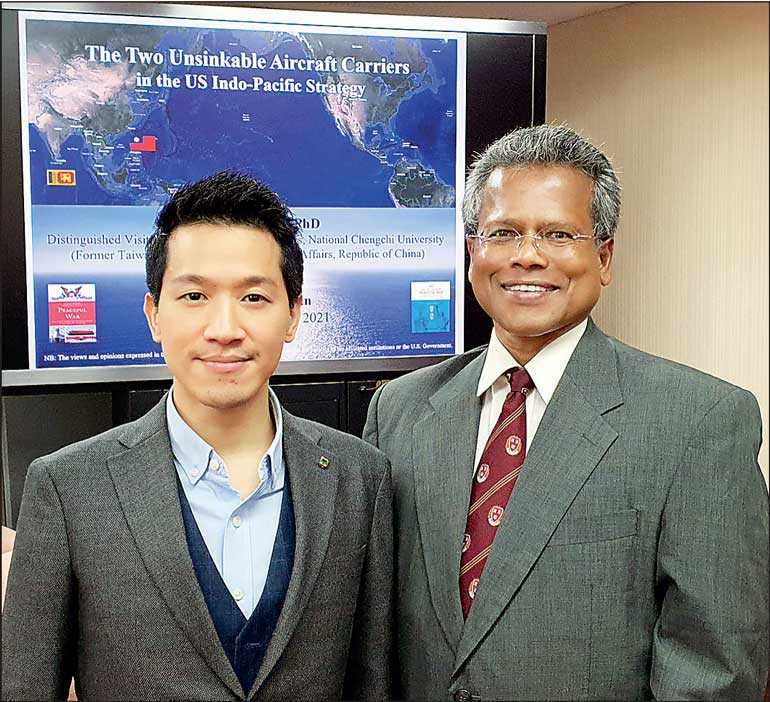Sunday Feb 22, 2026
Sunday Feb 22, 2026
Friday, 7 May 2021 00:00 - - {{hitsCtrl.values.hits}}

Mark Ho Chih-wei (left) of the Legislative Yuan (Taiwan Parliament) chaired the speech of Dr. Patrick Mendis of the United States – Pic by Peter Peng-tzu Hsuan
By Corey Lee Bell
Taipei, Taiwan: The United States must prevent Taiwan from surrendering to China or face an American ‘Century of Humiliation,’ the Sri Lankan-born former American diplomat and NATO and Pacific Command Military Professor told an assembly of dignitaries and scholars at a forum held at Taiwan’s Legislative Yuan recently.
If China gains control of both these two “unsinkable aircraft carriers” of the islands of Sri Lanka and Taiwan in the Indian and Pacific Oceans, Beijing will be well-positioned to control the key maritime trade routes and seas, including the South China Sea.
This was one of the core themes of Professor Patrick Mendis, who was invited by Honorable Mark Ho Chih-wei, a prominent lawmaker of the Democratic Progressive Party in the Legislative Yuan, to address the legislative body. The American scholar titled his speech, ‘The Two Unsinkable Aircraft Carriers of the US Indo-Pacific Strategy’.
Reflecting on US President Joe Biden’s first 100 days in office, Dr. Patrick Mendis opined that the new administration was right to follow President Donald Trump’s policy of responding to Chinese aggression and showing solidarity with Taiwan by sending officials to the island and deploying military assets to the region.
However, he felt that now was the time to abandon Washington’s long-standing policy position of “strategic ambiguity” to Taiwan and show instead “strategic clarity.” This means that the US should be committed to defending Taiwan unconditionally.
In the backdrop of a discussion on Sino-American competition, Dr. Mendis stated that Taiwan was vital to American interests from both a geostrategic perspective, and in terms of retaining American prestige and influence within and beyond the Indo-Pacific region.
The Professor noted that the first American interest in Taiwan harks back to World War II, when General Douglas MacArthur’s famously stated that the island is an “unsinkable aircraft carrier.” Now just as much as during the early Cold War period with the former Soviet Union, the fear is that an occupied Taiwan could be used by American rivals to serve it as a base to threaten American facilities in Okinawa, Guam, and beyond. It could also be used as a platform to push the US Navy out of the Western Pacific completely.
The second is the issue of US prestige and credibility relates to the point that America’s global influence rests on the confidence of its allies. These allies and friends retain the willingness and capacity of Washington to protect those who share the founding values and democratic ideals of the United States. If Taiwan fell to China, regional allies such as Japan and South Korea will immediately come under threat and could be dragged out of America’s sphere of influence. However, the loss of American authority and influence would likely extend globally and be irreversible over the medium- to long-term.
Indeed, this would perhaps mark the beginning of an American ‘Century of Humiliation’ – a term used to describe the dramatic collapse of China’s power and prestige after Hong Kong was ceded to the British in the wake of the Opium Wars (1839-42).
Outlining the challenges the United States faces, Dr. Mendis pointed out that the remarkable success of China’s strategic efforts to extend its influence in other parts of the region. This success, he noted, could be attributed to its adeptness at using a mixture of soft and sharp power in line with its “water and rock” doctrine of China. This doctrine draws upon the idea—discussed in the Chinese Daoist classic by Lao-tzu—that water could flow around obstacles while retaining the power to erode and penetrate rock.
Highlighting the potency of this approach, Dr. Mendis cited the example of China’s use of Buddhist diplomacy and “debt-trap” strategy to help secure a 99-year lease of Hambantota Port in Sri Lanka—an island which he referred to as another “unsinkable aircraft carrier” in the Indian Ocean. With the completion of the China-built Colombo Port City, Sri Lanka will essentially become a vassal state of China, he explained.
To meet these challenges, Dr. Mendis suggested that the United States should take a leaf out of the book of China’s “water and rock” doctrine. He said that when the US was a rising and then dominant power, its overarching agenda for making “the world safe for democracy” was its “guns and butter” strategy of using massive surplus fiscal and material resources to develop unparalleled military power and influence.
With China making relative gains in economic and military power, the United States will need to better leverage its soft power as well as its diplomatic, economic, and intellectual resources to achieve the same geostrategic goals. Dr. Mendis pointed to President Biden’s success in expanding consensus and cooperation with the other “Quad” nations—Australia, India, and Japan—as proof that a nascent form of this strategy is beginning to take shape and pay dividends.
If the Biden White House continues its ‘America is Back’ strategy, Professor Mendis added, the United States will be better positioned to deter China from taking military action against Taiwan and even attract Sri Lanka to continue its democratic traditions—as free and independently governing sovereign nations in the Indo-Pacific region.
(Corey Lee Bell is a postdoctoral researcher in Taiwan. He has a PhD from Melbourne University’s Asia Institute and is a former editor of Taiwan Insight.)